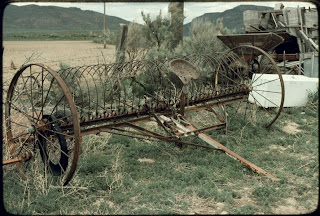Raking hay with horses
 Photo by Howard W. Marshall, 1978, at Paradise Valley, Nevada
Photo by Howard W. Marshall, 1978, at Paradise Valley, NevadaFrom the Library of Congress "Buckaroos in Paradise" collection
Old horse-drawn machinery, lined up along a fence, was a familiar sight when I was growing up in the 1950s and 1960s . Most farmers and ranchers had a few relics of horse-powered equipment, like this hay rake, that were quietly rusting away.
Rakes like the one above were used in hay-making. Step 1 in the hayfield was mowing the hay and letting it dry in the sun. Step 2 -- gathering the dry hay into a windrow -- was accomplished with the hay rake. Step 3 was gathering the windrows and either making a haystack or hauling the hay to a barn.
The hay rake was pulled by one or two horses, across the mowed, dry hay, with the long, semi-circular teeth lowered to the ground. When the rake was full of hay, the teeth were raised and a windrow of hay was dumped. Then the teeth were lowered again, and the rake continued across the field, until it was full enough to dump again.
The next time the rake came across the field, its rider dumped the hay each time he came by a windrow from his first trip. In this way, the windrows were made longer and longer, until finally, all the hay was raked into long lines that stretched across the hayfield.
The man on the rake lifted the teeth with a lever. Some strength was required to operate it. He also had to be attentive in order to dump the hay exactly at the end of the windrow.
This rake looks like it might be 10 feet wide. What a radical change the tractor made in the hayfield! With tractor power, dump rakes doubled and tripled in length, greatly reducing the time required to rake a field of hay.
Related posts:
The Hayfield
Caring for Our Own
Interesting websites:
Hay in Art
Hay Time
Horse-powered Haying, 1880-1940s
7 comments:
This reminds me of my family farm. All the old equipment was lined up on the hillside as a reminder of days past.
I wish I had some photos of the old farm... I miss our life as it was back in the day...
Thanks for sharing this post!
Hi, Mrs. Mom. I suppose at first, they thought they should keep the horse-drawn equipment "just in case." Later, when they knew they'd never use it again, they couldn't sell it. No one wanted it.
Now, people want an antique piece of farm equipment to park in their front yards for decoration.
Some people collect antique farm equipment. Runaway Imagination posted some interesting photos of his cousin's collection of horse-drawn machinery.
Cool.
When I was growing up in ne. we had inlaws & outlaws that had stuff like this sitting around; never saw it being used but my dad & mom knew all about it.
aside - just saw your fb entry.
-zane
My family used one of these in Central New York in the 1950's.
I can see from the photo that this horse drawn dump rake had it wooden tongue shortened to use with a tractor. That is what we did- this machinery was cheap.
We put our hay in loose for many years until we bought a New Holland baler- pre PTO with the large Wisconsin engine!
I just found 3 of these on my land down in W.V. Thanks for sharing
I just pulled out my Daddy's old rake, I can remember riding it. I love the good old days
I'm 81 now and did hay raking with horses with a dump rake I was probably 15.16 17 going towards the farm I had to hold the horse back to slow down going away from farm that just plodded along My mother made a stool out of the rake seat I still have it this was in ND
Post a Comment